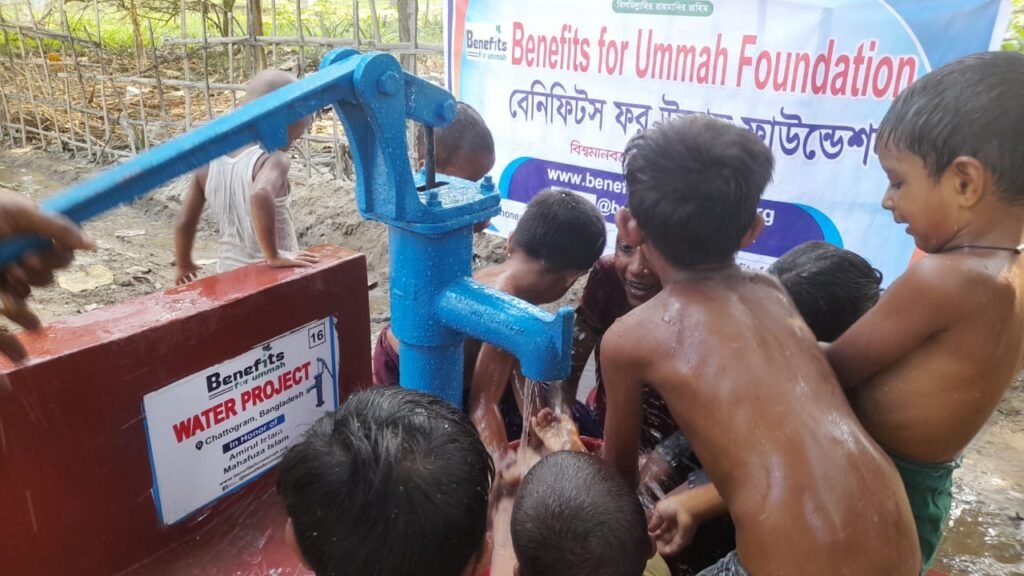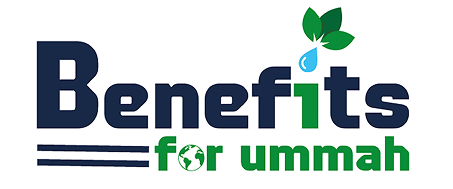Water
Water Sanitation and Hygiene

Water and hygiene are vital to life.
Globally, over 2 billion people lack access to safe, readily available water at home. In Africa and South Asia, Benefits for Ummah provides access to safe and clean drinking water where it is most needed. A Single Water Well can serve a community of around 3,000 people, and a Hand Water Pump can serve up to 200 people.
Water and hygiene are vital to life. Without them, we would not be able to enjoy a good quality of life, maintain good health, and even survive. However, some people still have difficulty accessing water. While more than 2 billion people can’t access safe and clean drinking water, half of the whole population of this world still lacks access to sanitation facilities. And almost 1 million die from water and sanitation diseases. Surprisingly, it’s also a scene of some developed countries competing in rural areas. After the devastating attack of covid-19, investing in safe water, well-maintained sanitation, and hygiene has become more essential.
Why Focus on Water and Hygiene?
Water, sanitation, and hygiene (WASH) are fundamental to promoting human health, education, and socioeconomic development. A lack of clean water for drinking, cooking, and other household uses, along with poor sanitation and hygiene practices, puts people at risk of contracting waterborne illnesses. Especially children who are more susceptible to disease get affected by diarrhea, and over 700 children under five are embracing death every day.
In many parts of the world, women and girls collect water and manage household hygiene. By providing access to clean water and sanitation facilities, they can spend less time on these tasks and more on education and income-generating activities.
However, improved WASH infrastructure can contribute to economic growth by reducing healthcare costs and increasing productivity. So, by focusing on water and hygiene initiatives, we can create healthier, more resilient communities where everyone can thrive.
Benefits for Ummah Water and Hygiene Program Goals
Universal access to clean water and hygiene is essential for improving public health and well-being. Our efforts aim to improve access to clean water and sanitation, and we are working to make this a reality. Our program is designed to keep sustainability in mind, including developing long-term plans to maintain and repair water and hygiene facilities. Our program includes the following-
- We aim to ensure easy access to clean and safe water globally for drinking, cooking, and other domestic purposes. So, we invest in water infrastructure projects such as wells, boreholes, water filtration systems, and other infrastructure that provides clean and safe water to communities in need.
- We can support and arrange severe water and hygiene management activities and programs for local communities, such as water harvesting, water efficiency, desalination, wastewater treatment, etc.
- We want to ensure everyone has adequate sanitation facilities such as toilets, handwashers, soap, etc. This will help to prevent the spread of waterborne diseases and improve overall hygiene.
- We can work to reduce pollution, eliminate dumping, minimize hazardous chemicals in water, and improve its quality.
- We encourage communities with educational components that promote good hygiene practices such as handwashing, personal hygiene, and safe food handling.
- We also work to increase global awareness about the high proportion of untreated wastewater and substantially increase recycling and safe reuse by using technologies.
How can You Help Us
Despite progress being made, challenges still remain. We need help to reach and cover many poor and marginalized populations due to fund limitations. With your support, it becomes easier for us to provide access to safe and clean water and hygiene.
- We can build more wells and water treatment facilities in areas that lack access to these essential resources, and promote good hygiene practices.
- We can arrange more education and awareness programs to help communities understand the importance of clean water and good hygiene practices, empowering them to maintain these improvements over the long term.
- We can also prepare with more emergency relief, including clean water and hygiene supplies to distribute in times of crisis like natural disasters or conflict.
